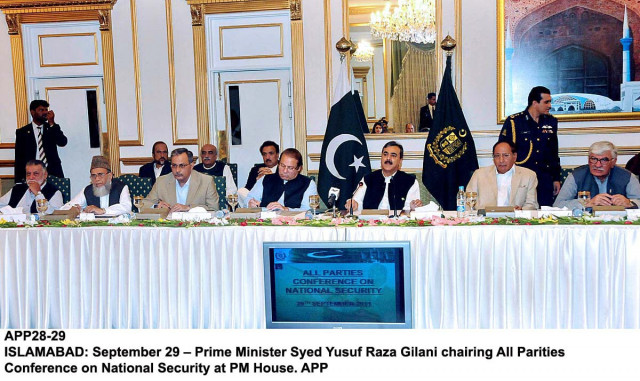Victory for the terrorists?
The question is who of the political or military will talk to Taliban to persuade them to spare Pakistan?

Some of the invitees of the APC feared international reprisal. Maulana Fazlur Rehman recommended talking to Russia and China to prevent America from imposing sanctions on Pakistan through the UN Security Council. He, however, forgets that Russia is still chafing over the defeat of the Soviet Union and complains of Pakistan’s involvement in the recent attacks in Moscow by Chechen extremists. And Maulana Samiul Haq — whose madrassa is named Haqqania — said that the Haqqani network is indigenous to Pakistan despite the fact that it controls several provinces in Afghanistan and attacks Kabul at will. Point to note: like his father, commander Sirajuddin Haqqani attended Maulana Samiul Haq’s madrassa Darul Ulum Haqqania, in Akora Khattak, near Peshawar.
Army chief General Ashfaq Parvez Kayani says he is opposed to “military operations against our own people”. The next question is who will talk to the Taliban — Pakistani and Afghan — to persuade them to spare innocent Pakistanis and safeguard Pakistan’s interests in Afghanistan? It won’t be the PPP government; it can only be the military and its thinking arm, the ISI. Will the Taliban talk? And the other — equally important — question is that what signal will Pakistan’s requesting talks send to the Taliban? Surely, not one that would suggest that Pakistan is seeking negotiations from a point of strength.
Every time someone reports that the Taliban of all brands — including the ones found in abundance in Punjab — are joined at the hip with al Qaeda, he gets mauled. The truth is that talking to the Taliban is actually talking to al Qaeda. The other truth is that al Qaeda is strong because of the network it has developed inside Pakistan. Not only are the non-state actors linked to it but also the madrassa network from Peshawar to Karachi.
Meanwhile, the military, as seen from the recent arrest of a brigadier, is busy cleansing itself of terrorist sympathisers. The new al Qaeda chief, Ayman al Zawahiri — as if in anticipation — has already published a critique of the Pakistan Constitution, laying out the minimum that it will require from the military before agreeing to peace. And the peace that will be achieved in pursuance of the objectives spelled out by the APC will let al Qaeda and its appendages stay on in Pakistan, and with greater power and influence.
In this context, the future looks very ominous. Many ordinary Pakistanis would not want to see in their country a regime like that of the Taliban in Afghanistan in the 1990s. That would be a most frightening possibility, one that clearly most sections of the media either is ignoring or perhaps wouldn’t mind being realised. After all, it has been said, and with some justification, that over the years, society has been radicalised to such an extent that some people may well be sympathetic to the cause of the Taliban, and by that, also al Qaeda. What is most disturbing post-APC is that the Pakistani military seems to think that it is not worth fighting the Taliban and their various allied groups, notwithstanding the fact that most of the 30,000 people who we say have been killed following our participation in the war on terror after 9/11 have died at the hands of the extremists and militants. And it boggles one’s mind to see that how can the politicians of this country not see this clear connection. They are living in a fool’s paradise if they think that with the Americans gone, the Taliban will hand in their weapons and give up their cause to set up a rigid theocratic state in Pakistan. If this is not a victory for the terrorists, one doesn’t know what is.
Published in The Express Tribune, October 2nd, 2011.



















COMMENTS
Comments are moderated and generally will be posted if they are on-topic and not abusive.
For more information, please see our Comments FAQ